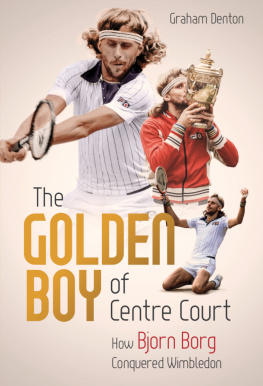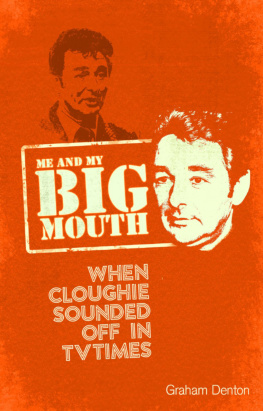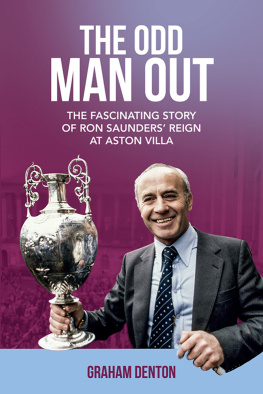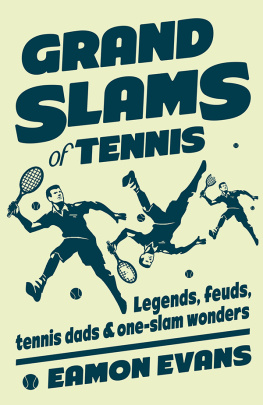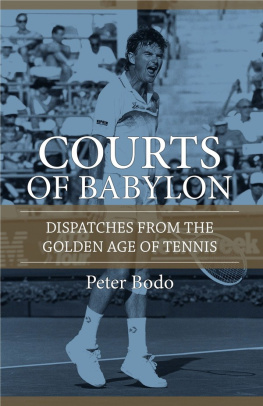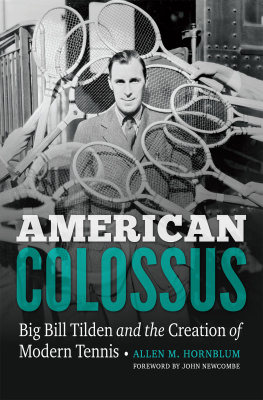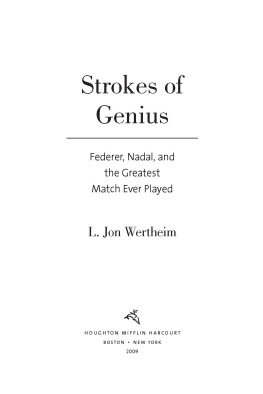Contents
Guide
For Bill Condon,
the finest tennis player never to
appear at Wimbledon
(or so hes always told me)
First published by Pitch Publishing, 2021
Pitch Publishing
A2 Yeoman Gate
Yeoman Way
Durrington
BN13 3QZ
www.pitchpublishing.co.uk
Graham Denton, 2021
Every effort has been made to trace the copyright.
Any oversight will be rectified in future editions at the earliest opportunity by the publisher.
All rights reserved under International and Pan-American Copyright Conventions. By payment of the required fees, you have been granted the non-exclusive, non-transferable right to access and read the text of this e-book on-screen. No part of this text may be reproduced, transmitted, downloaded, decompiled, reverse-engineered, or stored in or introduced into any information storage and retrieval system, in any form or by any means, whether electronic or mechanical, now known or hereinafter invented, without the express written permission of the Publisher.
A CIP catalogue record is available for this book from the British Library
Print ISBN 9781785317774
eBook ISBN 9781785319402
--
eBook Conversion by www.eBookPartnership.com
Contents
The Iceman Cometh
THE SPIRE of St Marys Church rose up in the distance like a pencil point sketching a sky over south-west London. Standing on the roof of the competitors tearoom at the All England Club, home of the Wimbledon Championships, the oldest tennis tournament in the world, a 16-year-old Swedish boy was gazing out over the expanse of outside courts towards it. It was early July 1972, and the youngster had not long claimed the title of Wimbledon junior champion, emerging from the final of the invitation event victorious against Britains Christopher Buster Mottram. Beside him, John Barrett, a former Davis Cup player and captain, asked the boy what his ambition was in the game. To be the best player in the world, came the quiet reply. It was, Barrett later recorded in his book, 100 Wimbledon Championships: A Celebration, spoken without a trace of conceit, stated as a fact.
Its perhaps appropriate that Bjorn Borg, born in 1956, came into the world on 6 June. For it was a national holiday celebrating Swedish Flag Day, a day that marked the crowning of the countrys first monarch, King Gustav Vasa, in 1523 in effect signifying the end of the Danish-ruled Kalmar Union, and the birth of Swedish autonomy as well as commemorating Sweden adopting its constitution on the same day in 1809. Appropriate because, the only child of Margarethe and Rune he was given his fathers name for a middle name Bjorn Borg grew up a spirited, strong-willed and thoroughly independent individual determined to plough his own furrow.
He was born and brought up in Sodertalje, an industrial manufacturing town of then around 40,000 people, 30 minutes drive south-west of the countrys capital, Stockholm. A predominantly working-class town, it was most notable for producing Volkswagen car parts. And ice hockey stars. Borg, like most Swedish schoolboys, was raised on the game, reared on a rink, slapping a puck back and forth. He was a highly promising player. Even at the age of five he showed signs of outstanding talent. At nine years old, he became the centre-forward for his towns junior team. The game was almost an addiction for him and for those first nine years of his life, the young athlete had no greater aim than to wear the jersey bearing the emblem of the Three Crowns, the shirt of Tre Kronor, the mens national outfit. There were many who considered him more than capable of achieving it.
Call it fate, providence, a happy accident, what you will, but, in the summertime of 1965, everything changed. Although an article by Shirley Brasher in The Observer, 3 June 1973, would state that had it not been for a lucky raffle ticket and a winning draw at his fathers local table tennis club, Borg might never have played tennis at all, while English sports journalist Frank Keating had it that Mr Borg actually made his son his first wooden racket, the generally accepted story is slightly different: that Rune, 33 at the time and employed as a clothing salesman, was a very fine table tennis player one of the countrys best and when he collected, as first prize in the towns annual championship, a golden, adult tennis racket, not interested in the game himself, he bestowed it to his son to simply, as Borg later recorded, play around with. And thats how I started playing, Borg would confirm time and again over the years as the tale became the stuff of legend.
Initially fascinated by its frame, once Borg took possession of the racket, tennis took hold of him. Starting playing, however, wasnt that straightforward. The racket too heavy for him to hold, the right-handed Borg gripped it with both hands, playing all his shots, forehand and backhand, in what was a distinctive two-fisted fashion, the way hed learned to swing an ice hockey stick. To begin with, even hitting the ball he found almost impossible. But Borg was undeterred. Launching fanatically into his new obsession, practice morning and night soon a daily ritual brought brisk improvement.
Smacking a ball against the grey garage door at his familys home in a large modern complex they lived in a first-floor apartment Borg spent every spare moment, long, solitary hours, competing with himself, but pretending in his fair-haired head he was Sweden facing a formidable foe in a Davis Cup rubber. If I hit the ball five times against the door, I got the point, he would recall. If less than five, the United States got the point. And though the repetitive thudding sometimes drove his mother to beg him to stop and certain neighbours to complain, the youngster ploughed on regardless.
Having at first been turned away from the overcrowded beginners course at the Sodertalje tennis club, when a vacancy opened, Borg spent the remainder of his summer there, honing his new skills from 7am until dusk, constantly pleading for someone to hit with, never willingly leaving the court until his parents collected him. Mrs Borg even asked if her nine-year-old son could enter the neighbouring village tournaments doubles to give him more match practice.
A placid, pleasantly modest child, Borg was, nonetheless, also one who possessed a vigorous urge to succeed; he strove to excel at whatever he did. Both Margarethe and Rune viewed his drive as a positive and necessary quality. In any field in life, they believed, you had to fight to achieve. It was something theyd always fostered. Weekends were spent organising games for him. On family boat rides to a close-by island, for instance, theyd tack a target to a tree and defeat the young Bjorn at darts. He was a boy who hated to lose. At anything. I cried and cried when I lost, Borg recalled. They would let me win then, and I would get confidence back. It was his parents, he would later acknowledge, that taught me to be competitive and persistent.
He was extremely stubborn as well. If his mind was set, his mother told ITVs Brian Moore during the making of a 1980 ITV documentary, it was impossible to change. That quickly became obvious at the tennis club. While Borgs homespun groundstrokes made him a laughing stock with some, they had others tearing out their hair. Told by older members to alter his two-handed grip, that what he was doing was wrong, the youngster resisted, sticking steadfastly with what worked best, what felt right. The members got angry with me, he recorded in his 1980 book,

